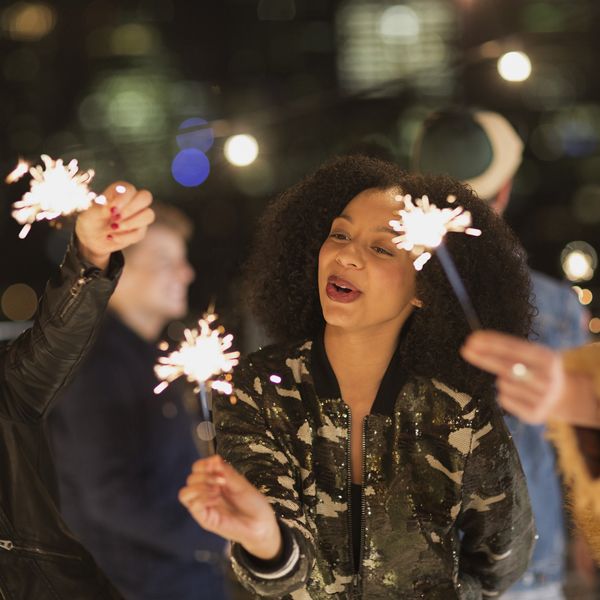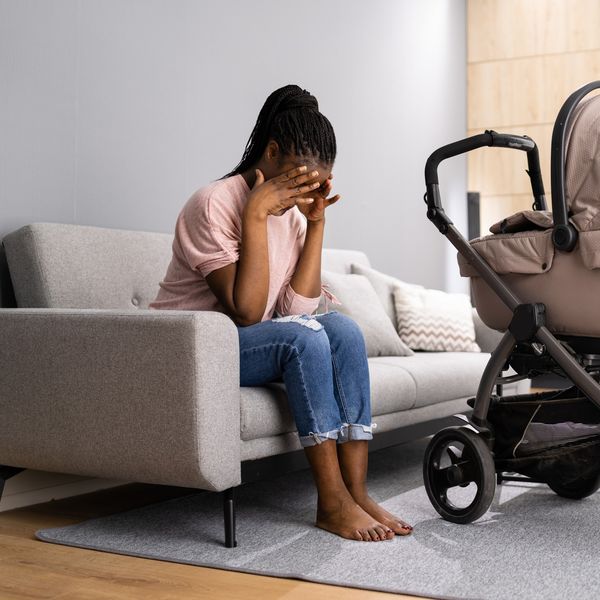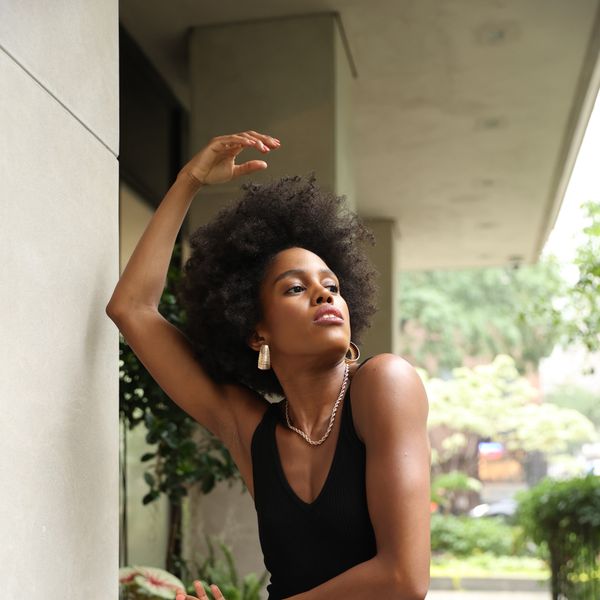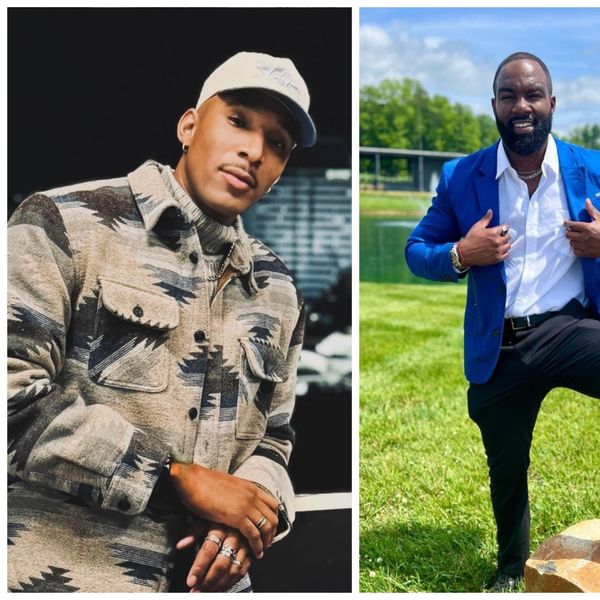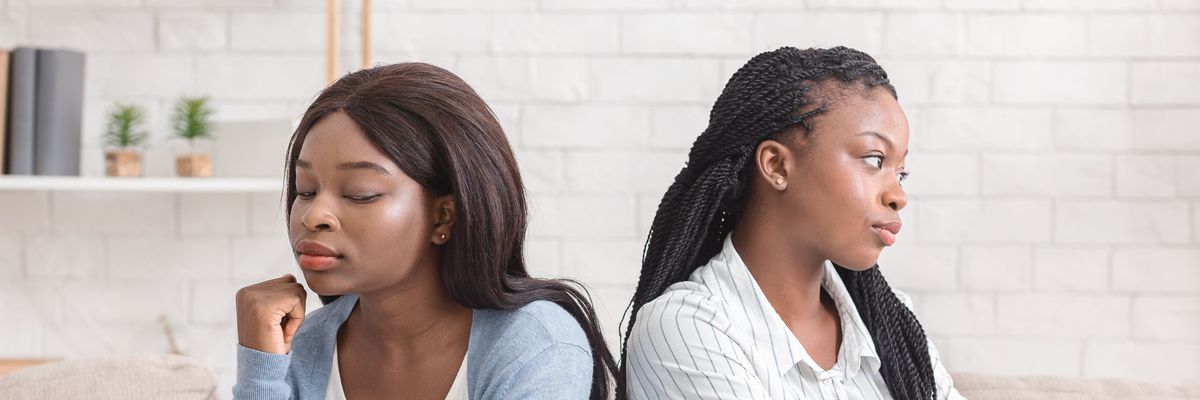
There’s an embarrassment of riches that comes with being a fan of ABC’s hit comedy Abbott Elementary. The show, which stars Quinta Brunson as Janine Teagues, Sheryl Lee Ralph as Barbara Howard, Tyler James Williams as Gregory Eddie, and Janelle James as Principal Ava Coleman, is about a group of mostly Black educators at a predominately Black elementary school in Philadelphia and has captured audiences for its tender, hilarious, and lighthearted depiction of what it's like to be a Black teacher to young Black students.
For many real-life Black educators watching the series, the show often reflects their real experiences dealing with the intersections of poverty and Blackness and all the other stuff that comes with teaching in America.
xoNecole reached out to several Black teachers to ask whether the beloved sitcom reflects what actually goes on in the classroom.
What are your thoughts on the show 'Abbott Elementary'?
Ms. Ora (1st Grade Teacher): I love Abbott Elementary! This is my first year as a teacher, but I worked in a D.C. middle school through City Year for the 2021-22 school year. There are a lot of little moments or little jokes that are made on the show that resonates with my experiences this year and last school year.
Mr. Wes (Middle School Teacher): I really enjoy the show, and you can really tell that they work closely with educators to make sure that they’re showing it in a truthful way. Even though it is a lighthearted show, some of the parts of it still trigger me in ways I don’t expect it to. Like the one teacher who’s teaching the combo 2nd and 3rd-grade class, the scenes of chaos in that class make me cringe like I’m watching a horror movie. I think Janine is also either an astonishingly talented teacher at her age or has the chillest second graders ever. I teach middle school, but from what I see/hear about from other teachers and my firsthand experience covering other classes, let’s just say I have a lot of questions (laughs).
What does the show get right about being a Black educator in a school located in a Black working-class neighborhood?
Ms. Ora: The students and the relationships the students have with the teachers are extremely accurate. It's hard to put into words what exactly is so distinct about it, but there is something different about how Black educators relate to their students who are Black (or of color) that the show is able to capture.
Ms. Destiny Stone-King (Middle School Teacher): It definitely highlights the joy of getting to relate to your students culturally and giving them that sense of security knowing that they have educators who look like them and have cultural similarities.
Which character do you most relate to?
Ms. Ora: I feel very much like a Janine. I'm new to education, I'm still learning, and sometimes I find myself wanting to fix more than I'm capable of fixing on my own. I also have my own Ms. Howard that I look up to at my school (who also happens to be a kindergarten teacher).
Mr. Wes: Definitely Gregory. I feel like I grew up in a strict, military household and I’ve learned how that type of instruction/behavior management does not always work and can sometimes even be counterproductive. I’ve learned how to let loose and embrace my ridiculous/fun side more and more. It took me a while to realize that the attitude and vibes I bring into the class affect how the students behave. Which seems obvious, but when you’re stressed out all the time because you didn’t have time to plan as much or you’re behind on grading, you’re not always thinking about how that affects your presence in the classroom. I see Gregory learning that, and that scene where he lets go and dances are one of my favorite moments in the whole show.
Anonymous (Pre-K & 4th Grade Teacher): This is a hard pick for me but I think I’m somewhere between Barbara and Janine. I have Barbara’s energy exactly where she and I are mostly calm and know what to expect from people, but I have a little bit of Janine’s optimism and desire to evoke change. Sometimes I think that Janine is doing too much and she does need to learn how to separate her identity from her job or else she’ll end up burnt out. But I’ve found a lot of older educators can be set in their way of doing things, like Barbara, and I don’t subscribe to that method either. If there is a problem, I like to explore solutions to the problem instead of accepting that some things just are the way that they are. So I want to change things within my power, but I’m not as unrealistic as Janine.
What made you want to get into education?
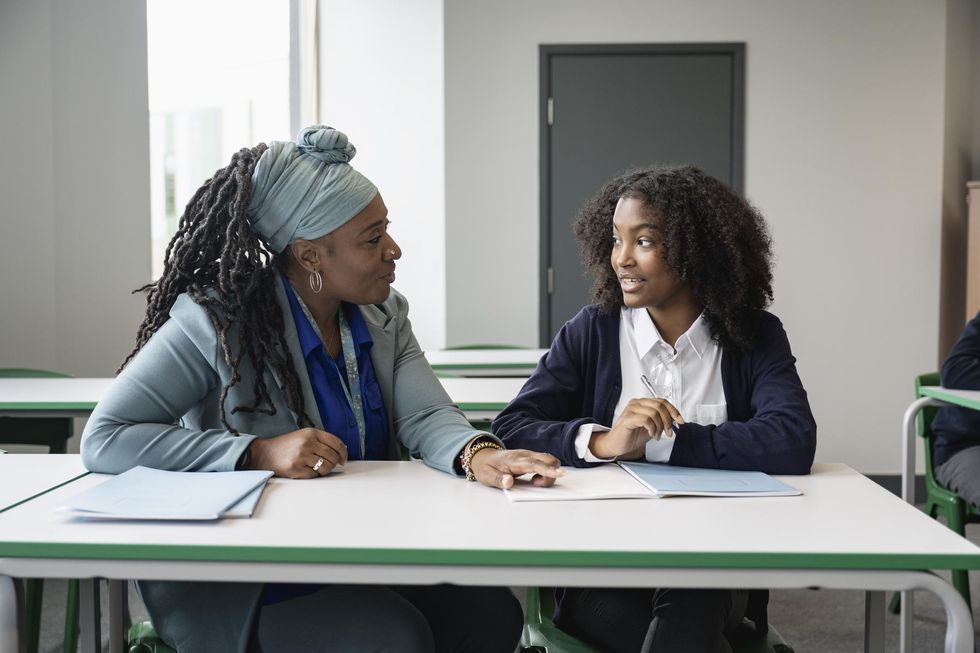
Johnny Greig/ Getty Images
Ms. Ora: Honestly, I'm not sure. I started my undergraduate degree with every intention of going into law or some form of international relations, but as I neared the end of my degree I found myself being interested in teaching ESL at some point in my life. Every time I thought about teaching, I got really excited--I loved the idea of teaching the fundamentals of language, which is what made me want to teach early elementary in particular.
Ms. Stone-King: It’s literally in my blood. My grandma, grandpa, and parents were all teachers. As an independent artist who is pursuing my career as a singer, songwriter, and recording artist, I like that I can mix my passion for music with education and still have time in the evenings and weekends to work on my craft. I also specifically wanted to teach in predominantly Black schools because I only had one music teacher who looked like me from elementary up to college, so I wanted to show students that they can do this too if they want.
Ms. Chelsea (Pre-K Teacher): My grandmother was a teacher. She was actually a principal for the school for the deaf and the blind in Jamaica. She was a big leader in being more welcoming and accepting of those with exceptionalities in Jamaica and even when she left, [she] carried on those values to raise me in the U.S. with my mom. She was also my Pre-K teacher when I was little which was fun. I also am an only child and always loved taking care of kids and playing with kids. When I was in high school, my neighbor’s kids would knock on my door after school for me to play with them and my mom would be like, “You know she’s 16, right?” but we all didn't care. I loved spending time with them! So I decided to go into education because I just felt happy when I was working with kids and watching them grow and learn something new.
What’s something you hope the show touches on?
Ms. Stone-King: I hope the show has an episode about the arts!
Mr. Wes: I really hope they get into teacher unions. I’m very pro-labor and pro-union, but many of these establishment unions in large cities have become closer to school districts than a united labor force; bureaucracy, power trips, and just general apathy are what I feel like I get sometimes from my union. At a higher level, there’s obviously the tension between districts and unions, but I think the real intrigue is going deeper into what actually goes on in teacher unions. If a teacher has a serious issue, how are they helping address it? Many unions do great work but I feel that others need to take a serious look in the mirror and assess how they are actually helping the educators that they represent.
Ms. Kaitlin (4th Grade Teacher): I understand Ava blackmailed her way into the principal role, but let’s talk about how Gregory, who I adore, anticipated becoming principal without ever having taught. Ava drives those teachers crazy, but what would drive a teacher even crazier is being led by someone who has never set foot in a classroom. Let’s bring that back up, please! I want to know why Gregory thought principal-ing was something in his near future.
What would you like fans of 'Abbott Elementary' to know about the realities of working as a Black educator that they might not glean from the show?
Ms. Stone-King: Teaching is already an emotional investment, but especially being a Black educator working with Black students, you feel a greater responsibility to protect them but also expose them to possibilities that they’ve been conditioned to stay away from because of the color of their skin.
Anonymous: People will expect you to volunteer your time because we work in a caring profession, and then they’ll make you feel bad for asking about pay. This means that they’ll expect you to work during your lunch, come in after school, stay after school, and work late nights for free and not even suggest payment for these services. For teachers especially, if you take the day off you have to leave lesson plans for the person covering your classroom. They will likely call you on your off day and think you’re in the wrong for not answering the phone (if you don’t).
People know exactly what children need to learn and yet you’ll still need to advocate for your children especially to receive those support. Smaller class sizes, flexible seating, and empirically-based curriculum/technology do not come cheap or easily. The episode where they had additional money in the budget and Janine wanted a computer for the students so they could have a comparable experience to the charter was very real, and then for that money to get snatched up to address the rat infestation was even more tragically accurate.
Some things in the show seem too terrible to be true. I want fans to know that they are based in reality.
What are ways for the public to support Black educators and their students?
Anonymous: Please fund your schools, and vote for people who will fund the schools adequately. The money is plentiful and the real issue is that they are using it for reactive services versus proactive (education). Be involved in your local school district (volunteer, show up to after-school functions, and be an active member of the school boards). I mean this, especially for Black people and people who are invested in issues that impact Black people. The best way to support Black educators and our students is to show up.
As I said earlier, everyone relies on schools for a number of resources: dental and vision exams, therapy (occupational, physical, and emotional), parenting support, and more. Doctors will write prescriptions to parents to bring their child to school for evaluations, versus using outside agencies/referrals to evaluate children due to financial restraints. This is the foundation of our society for many families and it needs money and support in order to help our neighborhood grow.
Ms. Kaitlin: To voice Janine, the best way to support Black educators is by building community with them. The first Black working-class school I had taught in was in Bowie, MD, and we thrived from a beautiful balance of parent, teacher, and faculty involvement. Parents regularly helped with school lunches and special event days, teachers collaborated often, and faculty gave us helpful feedback and resources. It was an idyllic school setting, and the students absolutely thrived there. Another way to support a Black educator is by giving them money.
Ms. Rhyanna Morgan (2nd Grade Teacher): VOLUNTEER!!! Many public schools are short staffed and we need people that look like us helping us. Students need to see adults pitching in to take care of schools and the people in them. Make your voices heard, know what is going on at your neighborhood school, keep tabs on the school boards of Black and Brown cities. These things keep the community involved and keep schools safe and keep children with the education they deserve.
What advice do you give to any Black person who might be inspired to become an educator because of 'Abbott Elementary'?
Anonymous: I would advise anyone inspired to become an educator because of Abbott Elementary to go work/volunteer in a public school so they can learn the profession before committing to it. Abbott isn’t lying about how much is required of teachers. Teachers aren’t just teaching math, but they are also teaching about social skills, managing emotions, and now they’re taking temperatures. I would also advise anyone who wants to work in education to spend some time working with children with disabilities at specialty schools and settings. I want anyone aspiring to be an educator to familiarize themselves with special education and the research pertaining to how it impacts Black and brown children differently than it does white children.
Ms. Kaitlin: Care for your Black students as the teachers of Abbott Elementary care for theirs. In predominantly Black working-class schools, often educators and faculty police their students instead of care for them. The reasons are many-fold, but I hope that they are unlearned swiftly. I radically (at least it felt radical in my D.C. school), refused to raise my voice at my students. I had come out of an abusive relationship and learned that yelling was not a natural form of communication. This was something I had translated to my co-teacher, but she was not on board with the practice, so much so that she, a fellow Black educator, claimed that these students were “from the gutter,” and thus deserved to be spoken that way. They were nine. I don’t know how you look at a nine-year-old child and see them that way, or speak to them with such animosity. The way the teachers of Abbott Elementary speak to and care for their students should be replicated in schools everywhere.
Ms. Chelsea: Do your research on the schools you want to work at, ask to come in and observe. See how you feel in the space. Don’t be quick to run from the job. (I say many times a day I’m going to quit but I’m not serious, haha, I love what I do even when it's hard.) Reach out to me if you want to observe or see what different classrooms look like. I’m happy to share. I’m big on diverse children’s literature and can share my recommendations, etc.
Let’s make things inbox official! Sign up for the xoNecole newsletter for daily love, wellness, career, and exclusive content delivered straight to your inbox.
Feature image by Klaus Vedfelt/ Getty Images
- How Valencia Clay Is Redefining What It Means To Be An Educator ›
- Black Women On How They Found The Therapist That Was ‘The One’ ›
- 8 HBCU Alums On How School Shaped Their Lives ›
- 'Abbott Elementary' Proves That TV Can Build Community ›
- To Be Young, Gifted & Black: 5 Black Educators On The Power Of Representation In The Classroom ›
Your December 2025 Monthly Horoscopes Are All About Surrender & Alignment
December is about letting go. We end the year with the need for more peace, reflection, and rejuvenation, and that is exactly what December is providing for us. The Sun is in Sagittarius, and anything is possible. This is the month to believe in that and to know that the universe is supporting you. With a Supermoon in Gemini as we begin the month as well, we have an opportunity to gain the closure we have been looking for this year and to wrap up old projects, ideas, and communication breakthroughs.
This is the month to make your peace the priority and let go of trying to control the way the tides are turning. Trust in your new beginning, and give yourself time to prepare for it this month.
A big part of the clarity that is coming through this month is due to Neptune going direct in Pisces on December 10, after being retrograde here since July. With Neptune now direct, we are able to see our inspiration and creativity a little more clearly, providing the perfect energy for dreams and manifestation to be built upon. The smoke is clearing, and it’s up to you to decide what you want to do with this newfound clarity that this transit is bringing. Mercury also moves back into Sagittarius on December 11, which is great for communication and clarity, and the adventures you were trying to see through at the beginning of November come around for you again with greater purpose and support.
On December 15, Mars enters Capricorn until the end of January 2026, and this is the extra push we need to make important changes and to be on the path towards greater abundance, stability, and prosperity. Mars in Capricorn takes care of business, and we have extra energy at our disposal during this time to do so. This transit is an ideal time to focus on your career or financial goals for next year and to start putting some of these plans into motion now. A few days later, we have the New Moon of the month, which will be in Sagittarius on December 19, and this is the perfect New Moon to manifest.
The energy is high, magic is in the air, and it’s all about moving forward with the new beginnings that are inspiring you and bringing you joy to think about right now.
Capricorn Season officially begins on December 21, and this earth sign energy is how we heal, gain closure, and build new foundations in our world. With Venus also moving into a Capricorn a few days later, there is something about peace, prosperity, and security that we are gaining in life and in love as we close out the year, and this is what we need right now. This month is about reflecting on what was, letting go of old hurt, and renewing. December is an ending and a new beginning in one, and there is magic in this space to be created.
Read for your sun and rising sign below to see what December 2025 has in store for you.
 AriesKyra Jay for xoNecole
AriesKyra Jay for xoNecoleARIES
December is a full-circle moment for you, Aries. You are seeing the gifts in your world and have a lot of gratitude for the way things have come about for you as of late. There are culminations in your world that are providing you with more abundance, stability, and community, and you are exactly where you are meant to be this month. With the Sun in a fellow fire sign and in your 9th house of travel for most of the month, December is a good time to get out of your comfort zone, explore the world around you, and get your body moving.
Mars, your ruling planet, also makes a change and moves into Capricorn on December 15, which will fuel your inspiration and power in your career space. You are making a lot of professional progress as we close out the year; however, make sure to be more mindful of your competitive drive right now. The New Moon on December 19 is the perfect opportunity for you to create some new plans and goals when it comes to traveling, education, and where you want to gain some new inspiration in your world. Overall, this is a month of things coming together for you serendipitously.
 TaurusKyra Jay for xoNecole
TaurusKyra Jay for xoNecoleTAURUS
December is about trusting your intuition, Taurus. You have a lot on your mind this month, and it’s best to delegate, communicate, and allow yourself some relief by opening up to someone and not feeling like you have to hold everything in. As we begin the month, we have a Supermoon in Gemini happening in your house of income, and the plans and projects you have been building here come to fruition for you now. This is the time to gain clarity on your financial world and to take a look at what spending habits you want to let go of here as well.
With Venus in your 8th house of shared resources for most of the month, you are doing a cleanse on your commitments, partnerships, and business ventures. You are taking a look at what you want to dedicate yourself to in the future, and what commitments you may need to let go of now in order to be in the space you truly want to be, both financially and within some of your relationship dynamics. Before we end the month, we have a New Moon in this same area of your chart, and it’s time to look at the opportunities that are presenting themselves and to trust your internal guidance system to lead you forward.
 GeminiKyra Jay for xoNecole
GeminiKyra Jay for xoNecoleGEMINI
You are moving forward fearlessly this month, Gemini. December is your month of love, passion, and dignity, and you are owning the light that you shine. We begin the month with the last Supermoon of the year, happening in your sign, and you are stepping up to the plate. You are showing up, owning how much you have grown this year, and allowing yourself to heal while also acknowledging that you have done your best and you deserve to have fun in the midst of the changes you are creating.
Mercury, your ruling planet, is officially out of retrograde, and you can use this energy to the fullest potential now. With Mercury in your 7th house of love, it’s time to speak from the heart and to talk about the things that matter and that are inspiring you right now to your loved ones. You never know what kind of epiphanies you may have when you open up the conversation to others. Before the month ends, you have a New Moon in this same love area of your chart, and this New Moon is all about manifesting romance, commitment, and abundance in your world.
 CancerKyra Jay for xoNecole
CancerKyra Jay for xoNecoleCANCER
December is an opening for more love, more joy, and more freedom in your life, Cancer. You have come to a place where you hold so much gratitude in your heart for where you are today and where your heart is shining, and things come together for you with more ease right now. With the Sun in your 6th house of health, work, and daily routines for most of the month, you are getting your ducks in a row while also putting more energy and effort into taking care of yourself, your priorities, and your well-being. This month surprises you in many ways, and it’s because you are showing up.
Mars and Venus both move into your house of love, relationships, marriage, and abundance this month, and you are making strides in your love life. You have both of these opposing forces on your side and are being recognized for the love you are while also receiving the love you want. This month, overall, is about focusing more on the positives in your world and letting your heart have its joy. Before December comes to an end, there is a New Moon in Sagittarius, and this is the perfect opportunity to create the plans you want to see through next year, especially when it comes to your work life, colleagues, business ventures, and health.
 LeoKyra Jay for xoNecole
LeoKyra Jay for xoNecoleLEO
The scales of karma are balancing, and they are balancing in your favor this month, Leo. December is your month of truth, and of seeing it clearly in your world. The Sun is in your house of romance, pleasure, and happiness for most of the month, and it’s time to relax, be in the present moment, and allow what is meant to be, to be. With a Supermoon in your 11th house of manifestation as December begins, this is a powerful month for seeing your dreams come to fruition, and for feeling like the intentions you have set this year are finally here for you now.
Mars also moves into your 6th house mid-month, and this is the perfect energy to have to move into the new year. You have extra energy at your disposal right now and are feeling fearless with what is possible for you and your daily routine. Before the month ends, we also have a New Moon in a fellow fire sign, Sagittarius, and this is a breakthrough moment for you and your heart. December, overall, wants to show you how loved and supported you are and will be doing so in magical, unexpected, and concrete ways.
 VirgoKyra Jay for xoNecole
VirgoKyra Jay for xoNecoleVIRGO
December is a month of victory, Virgo. You are showing up and experiencing some new successes in your world that move you forward on your path in life. With a Supermoon in your 10th house of career as we begin the month, the effort and intentions you have made this year come into full bloom, and you are being recognized for who you are and the good work you have done. This month is all about showing up and allowing yourself to be seen and loved, knowing that you deserve the support and opportunities you are receiving.
Mars moves into Capricorn on December 15, which brings the passion and excitement into your love life, hobbies, and little pleasures in life that light you up. You want to have fun this month and are going to be walking into the new year with this fearless, happy, and spontaneous energy within you. Before the month ends, Venus also enters Capricorn, and in this same area of your chart, you have a lot to look forward to and believe in right now. Overall, December wants you to be happy and will be doing everything possible to make that happen for you. This is your month to shine, Virgo.
 LibraKyra Jay for xoNecole
LibraKyra Jay for xoNecoleLIBRA
December is a month of opportunity for you, Libra. New doors open, and you are financially making breakthroughs this month because of it. December begins with a Supermoon in your 9th house, and you are getting a clearer view of where you have been making strides in your life and how it has all brought you here to this present moment of freedom. This month is showing you what happens when you are fearless with your purpose and when you believe in yourself and what you are worthy of.
Moving further into December, Mars moves into your 4th house of home and family mid-month, and you are closing out the year in your safe spaces. You are spending more time with your loved ones and taking the time to quiet your mind and listen to what your heart has been telling you. Before the month ends, we have a New Moon in Sagittarius, happening in an area of your life that deals with communication. This is a great time for getting the answers you have been looking for and for feeling more clear-headed and confident about the decisions you are making as you move into the new year.
 ScorpioKyra Jay for xoNecole
ScorpioKyra Jay for xoNecoleSCORPIO
Patience is a virtue this month, Scorpio. December is all about remaining patient and vigilant with what you are creating in your world, and knowing that the universe has your back. It’s time to be reminded of the power of hope, and this month is an opening to greater clarity in your life. There is a lot of energy in your financial zones right now, and this is providing you with new opportunities and new insight; however, the speed at which things come about for you may feel daunting. Keep your head up and eyes focused on what you want and know that you are more than worthy of receiving it.
With Mercury in your 2nd house of income this month, December is a good time to plant new seeds and to think about where you want to be financially a month from now or even a year. This month is asking you to think bigger and to think more long-term so that you can set the appropriate plans into motion now. We also have a New Moon in your house of income before the month ends, and this is when you will see more of your dreams come to fruition in this area of your life, and have more opportunities to build. Overall, December will be teaching you a lot, Scorpio.
 SagittariusKyra Jay for xoNecole
SagittariusKyra Jay for xoNecoleSAGITTARIUS
Sagittarius Season is here, and there is a lot in store for you this month, Sag. December is all about what you are dedicating yourself to. It’s about setting your intentions and putting the work in to back up your dreams, and about getting things in order so that when the new beginnings come, you are ready for them. The Sun and Venus are in your sign for most of this month, and there are a lot of eyes on you right now. You have the potential to create a new beginning for yourself, and it’s time to invest in yourself, your love life, and your dreams.
Mercury moves into Sagittarius on December 11, and this is giving you another opportunity to see through some of the plans that you had initiated in November. Mercury was retrograde in your sign last month, and there may have been some disruptions to your vision and plans for the future, and now this energy is turning around for you. Before the month ends, we also have a New Moon in Sagittarius, and you are walking through new doors fearlessly. You are catching others by surprise by your growth this month, and you are thinking a lot about your purpose, future, and plans for the new year.
 CapricornKyra Jay for xoNecole
CapricornKyra Jay for xoNecoleCAPRICORN
December is all about the vision, Capricorn. You are moving through a lot of changes and transformations this month, yet they are giving you a chance at a new beginning in the process. You are focused more on the future and what goals you want to manifest for yourself right now, and are ready to let go of what hasn’t been working for you. With the Sun in your 12th house of closure for most of December, this is your time for healing, but remember, healing doesn’t have to be isolating or boring; you can thrive while you renew, and you are this month.
Mid-month, the excitement picks up for you, and you are feeling more energized than you have in a while. Mars moves into Capricorn until the end of January 2026, and you are being proactive with your goals, intentions, and passions. You are a force to be reckoned with this month, and you are making things happen for yourself with confidence. Capricorn Season officially begins on December 21 this year, and this is definitely speeding up your healing process. You are breaking free from what was, and with Venus also moving into Capricorn before the month ends, you are leaving this year in high spirits and with love opening a new door for you.
 AquariusKyra Jay for xoNecole
AquariusKyra Jay for xoNecoleAQUARIUS
December is all about community, creativity, and manifestation, Aquarius. This is the month to work together with others to help bring your dreams to life. You are in a space of inspiration, empowerment, and beauty, and are creating more of this energy around you and in your world. Look out for what support comes your way this month and know that you don’t have to do everything alone to succeed. With the Sun in your 11th house of manifestation and friendship, your intentions are coming to fruition, and it’s time to celebrate with the people you love and to own how far you have come this year.
On December 19, we have a New Moon in Sagittarius, lighting up your life in all of the best ways possible. This is your New Moon of freedom, victory, and magic, and you are seeing new beginnings appear that you were once just hoping for. Before the month comes to an end, Venus moves into your 12th house of closure, and after an active and successful month, you are ready to relax, heal, and give your heart some of the attention it has been asking for. You are moving into the new year with the need to release and renew what hasn’t been working in your relationships, and you are finally ready to.
 PiscesKyra Jay for xoNecole
PiscesKyra Jay for xoNecolePISCES
December is a big month for you, Pisces. You are making some huge accomplishments this month, and are feeling like everything you have been through this year has been worth it for these moments that are coming to fruition for you now. The Sun is in your 10th house of career and reputation for most of the month, and this is where a lot of your focus is right now. You are claiming your successes and putting yourself out there in ways that not only serve you, but that inspire others as well.
Neptune officially goes direct on December 10, after being retrograde in your sign since July, and you are finally seeing things a little more clearly. You are feeling renewed inspiration and passion in your life, and your intuition is your strongest asset right now. Before December comes to an end, we also have a New Moon in your 10th house of career, and what happens now not only changes things for you in the present, but it also opens new doors and what is possible for you in the new year as well. Overall, you are on top of your game this month and are owning the joy and empowerment you feel.
Featured image by Kyra Jay for xoNecole
Do You Expect Others To Read Your Mind? Here's The Problem With That.
Omniscience. If someone were to offer you $100 right this second for the definition of that word, could you immediately provide it? If you’re not sure, basically omniscience is about being able to know everything — and to those who believe in God, only he is given that honor. For those who believe in Satan? Not even he is omniscient (as much as he would like people to think otherwise).
Sometimes, it might feel that otherwise because some beings and even people are truly masterful when it comes to reading body language, observing patterns, and picking up on cues. Still, no matter how much it might seem like someone can read someone else’s mind, they can’t. It is literally impossible — and I will briefly expound on that in just a moment.
Oh, but there are plenty of people whose egos have them thinking that they can read someone else’s mind. Then there are others who have fantasies, which create unrealistic expectations that others in their lives actually should read their mind. And you know what — both of these things can cause unnecessary stress, drama, and trauma, if folks aren’t careful.
And that’s why I think it’s important that we unpack this a bit more. Because if you’re someone who thinks that if another person truly cares for you, they should be able to read your mind, it’s time to let that ridiculous yet semi-popular notion absolutely and completely go.
Here’s why.
It’s Scientifically Impossible for Someone to Read Your Mind
There are a couple of reasons why I am starting this off with R&B singer Avant. For one thing, I don’t think that he gets nearly enough flowers and secondly, clearly, this is a more-than-fitting song for today’s topic, wouldn’t you say? Because, lawd, there really is something that makes some of us feel all warm ‘n fuzzy about the mere thought of a man telling us that he is so in tuned with us that he can basically read our mind.
Hmph. Problem with that is, as I said in the intro, it is scientifically impossible (for us and for AI to do, praise the Lord!). And yet the fact that so many individuals think that they defy scientific data and research is oftentimes why there are so many breakdowns in communication — because if you run on assumption (that you can read someone’s mind) without clarification and confirmation, you can create issues that didn’t exist before you decided to fall for your own mind-reading theories.
Now to be fair, while science is still trying to figure out why we can’t read minds, what is sure is that we do have the capability to perceive the thoughts and actions of others if we’re willing to pay really close attention. However, do keep in mind that reading and perceiving are different. Reading? It’s about being able "to apprehend or interpret the meaning of" and "to anticipate, expect, or calculate by observation." Perceiving? It’s all about “to become aware of, know, or identify by means of the senses” and “to recognize, discern, envision, or understand.”
And already, do you see the differences? So much certainty comes with reading while perceiving is about humbling oneself (bookmark that) to not try to know everything but instead to try and understand what is transpiring. And since no one person (or their mind) is ever truly static, that is a huge part of the reason why believing that you can read someone’s mind — no matter how close you may be to them — is futile. You can change your mind on a dime. Others can do the same. Learning to perceive what is going on instead of assuming that you can “read” folks is far more beneficial.
Besides, you might be surprised by a particular demo who thinks that if you are truly who they need you to be, you will read their minds — and boy, once you know who they are, that may cure you of the whole “read your mind” ish…quick, fast and in a hurry.
The Expectation Is Oftentimes Rooted in Egomania
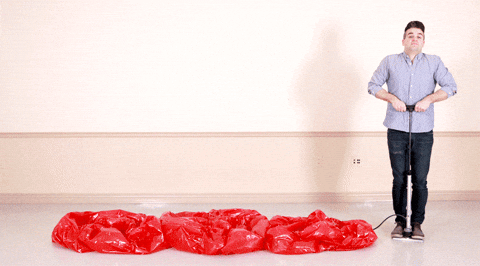 Giphy
GiphyWhile doing a bit of research on this topic, I thought it was interesting that a particular type of person kept coming up. Can you guess which one? A NARCISSIST. What I kept noticing is a telling sign of a narcissistic individual is they expect others to read their mind.
I must admit that I was caught off guard by that at first because narcissists and their damn egos are so out of control (bookmark that) that it would seem like they would be more focused on acting like they know the thoughts of other people. Here’s the thing, though — the reason why narcissists want others to read their mind is because they want you to do things like guess what they want and need before they ask — and they want that to happen because they believe that they are so damn special that you should put in the extra blood, sweat and tears to figure it all out. Hmph. Now that tracks.
Another reason why narcissists want you to be able to read their mind is so they can manipulate and deflect. Meaning, if you say and do things based on what you thought they wanted you to, should everything crash and burn, they can dodge accountability and blame you for it. Hmm, does reading someone’s mind seem romantic and beautiful now? SMDH.
And again, all of this is tied to ego because, at the end of the day, mind-reading is a form of control and narcissists are definitely very controlling people. And honestly, mind-reading is as well because why do you even want to know someone’s private thoughts before they share them and, at the same time, why would you want someone to have that kind of power in your life either? “Eww” is what immediately comes to my mind. “Yuck” is what follows.
So, why is it that so many people think that it’s a good thing to have someone read their mind — I mean, the ones who don’t show narcissistic tendencies, that is? Good question.
5 Reasons Why Some People Wish Someone Would/Could Read Their Mind
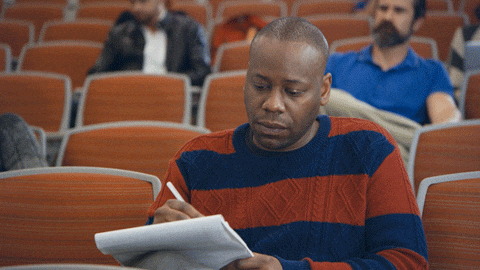 Giphy
GiphyOkay, so ego and pridefulness aside, what would be some other reasons why people think that it’s such a wonderful thing if someone who they are in some sort of intimate relationship with can read their mind.
1. They are caught up in Disney and rom-coms. One day, I am going to do an article on all of the ways that Disney and rom-coms have destroyed the reality of relationships. For now, I’ll just say that the scripted tales of both have caused a lot of people to think that if someone loves them, they should be able to read their mind. Nooo…if someone loves you, they should care to know what is on your mind. And that brings me to the second point.
2. They aren’t as good at communicating as they think. Are you a good communicator? One way to know if you are is you’re able to clearly articulate your wants and needs — because really, if you are able to do that, why should anyone even need to read your mind? Feel me? Let’s move on.
3. They want someone else to work harder at their relationships than they do. I say it in my sessions often — it’s beyond crazy to think that someone should work harder at figuring out what your wants, needs and expectations are than you are willing to express them. Hmph. It makes me think of a friend of mine who says that “should” is a dangerous word. What she means by that is saying that someone should do or not do something simply because YOU THINK that’s how it “should” go is a surefire way to stay disappointed and even be disillusioned. No, your man shouldn’t just know what you want every year for your birthday. Did you state it? If not, why aren’t you playing fair? Who has time for all of the guessing games and then getting penalized if they guess wrong? Stop it.
4. They think it’s the sign of a healthy relationship (it isn’t). Anyone who knows me knows that I am always and forever going to be Team Healthy over Team Happy and my reason why never changes. Only children expect to live in a world where they are happy all of the time — and yes, there are a lot of childish people out here. People who want their mind read? They tend to live in happy land. Meanwhile, a healthy relationship knows that clear communication, mutual respect, keen listening, patience and understanding that humans make mistakes are foundational to its success.
5. They are lazy. And yes y’all, some people want others to read their mind because they are lazy and it really is just as simple as that. Thing is, while they are being passive aggressive, dropping hints or giving the silent treatment so that you can figure out whatever it is that they…want you to figure out, that tends to take more effort than simply speaking up. Ridiculous, chile.
How to Let the Myth Go
 Giphy
GiphyGee, after reading all of this, suddenly reading minds just seems like a lot of silliness with a sprinkle of drama and potential trauma, doesn’t it? And it’s all because some people choose to treat something that is a myth like it’s a bona fide fact. SMDH.
And what if you happen to be one of those individuals? How do you break free? COMMUNICATE. Openly, clearly and maturely share what’s on your mind and heart because, the true tell of a solid relationship isn’t that someone can read your mind; it’s that they can retain what you’ve already stated.
Less reading. More perceiving. That’s the secret sauce.
And when you accept this for what it is, you will realize that it’s far better for you, your partner and your relationship to stop expecting the impossible and to accept what is actual: that learning your partner, as they strive to do the same thing with you, is better than you both assuming that you know what…maybe you do, maybe you don’t.
___
Author Frank Sonnenberg once said, “People can’t hear what you don’t say. Thinking isn’t communicating” — and I think this is a perfect place to bring all of this to a close.
Find the kind of relationship(s) where intention is so strong that mind-reading isn’t even desired.
At the end of the day, it really is as simple as that.
Let’s make things inbox official! Sign up for the xoNecole newsletter for love, wellness, career, and exclusive content delivered straight to your inbox.
Featured image by Shutterstock

